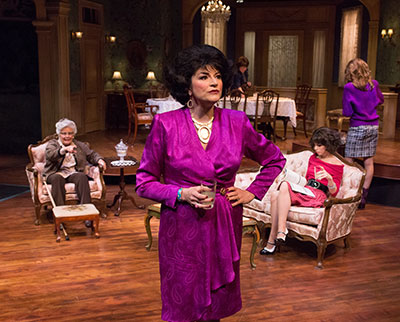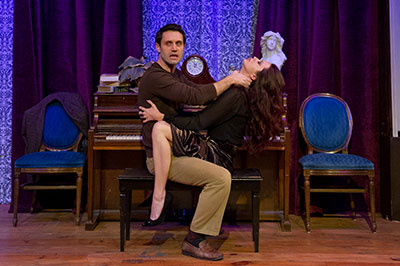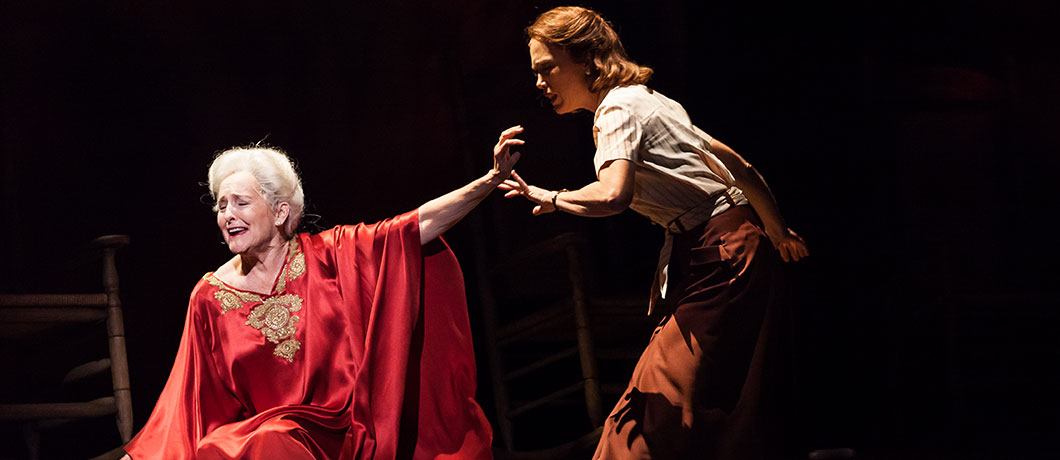Talking to Texas Actors About Equity
IMAGE ABOVE: Frederica von Stade and Carolyn Johnson in Houston Grand Opera’s production of A Coffin in Egypt. Photo by Lynn Lane.

Texas actors, let’s talk about the pros and cons of going Equity. To start the conversation, I interviewed actors from Houston, Austin, and Dallas. The first thing I learned is that there are too many Texas voices and far too many opinions to include in one article. This is a large and complicated subject. My hope is that this article will inspire Texas artists to ask these questions of themselves, their communities, theaters, and union.
The Actors’ Equity Association (AEA, aka “Equity”) is the US labor union for over 49,000 actors and stage managers. Their mission is “To advance, promote and foster the art of live theater as an essential component of our society.” Founded in 1913, Equity is the nation’s leading standard-setter for the industry. Equity oversees negotiations of member contracts, including minimum wage, hours, and work condition standards; provides access to healthcare and retirement plans; and offers member discount programs, among other benefits. In exchange, Equity collects an initiation fee of $1,100.00, plus yearly dues of $118, and 2.25% working dues deducted directly from members’ gross weekly paychecks. There are three ways to join Equity: you can earn eligibility by accepting an Equity contract as a non-Equity actor; through a sister union such as the Screen Actors’ Guild/American Federation of Television and Radio Artists (SAG-AFTRA); or through the Equity Membership Candidate Program (EMC). Through the EMC points program, actors earn 50 points by working at Equity-approved theaters to gain union eligibility. The first and most important rule for Equity members: Do not rehearse or perform without an Equity approved contract.
Let’s open the floor to some Texas actors.
Are you an AEA member?

“I never pursued Equity during the 10 years I lived in Chicago. At least at the time, the common wisdom there was that you needed to be very careful about making the decision to go Equity, as there was a load of work going on, but most of it was non-union. Thankfully, I was not Equity when I first moved to Houston or I would have had a much harder time getting work (at first). I accumulated Equity points over a few years, reaching the 50 week mark during a long-running show in 2006. I had the option to pay the initiation fee and dues to join the union, but AEA gives you up to 5 years to make the decision. I sat on this option for 2-3 years because I was afraid of losing non-union work—and potentially being out of work entirely. What I found was that once I was ‘eligible,’ word got around somehow that I had become an Equity member, so I wasn’t getting calls for non-Equity work anyway. I eventually found the confusion over my ‘semi-Equity’ status to be stressful—and in the meantime, I was paying working dues for my Equity roles but not getting any benefits for it, so I finally signed up in 2010.” —Carolyn Johnson, HOUSTON
“I joined as soon as I could. I had been working almost exclusively with a company which only offered Equity contracts to existing members… [But I would leave Equity] if my work slowed so much that dues became a burden or I knew I wasn’t getting jobs I normally would because of union status.”—Cameron Cobb, DALLAS
“I qualified to join Equity in the early 90s but did not become active until the last two years. Living in a ‘right to work’ state has afforded me the opportunity to work under an Equity contract without requiring me to join the union and I have done so on numerous occasions. There are many independent theater makers and producers who are unable to afford Equity contracts and I felt joining the union would limit my ability to work with companies I love and admire. However, I recently decided to join for the health benefits—offered only if you qualify by working the required 21 weeks per year—and I began to feel that I was taking advantage of the union by availing myself of its benefits as I was working under union contract but not paying dues.”—Barbara Chrisholm, AUSTIN
“I joined the union in summer of 2012 at the first chance I could. I expected to be hired under Equity contracts and to be paid for my level of skill and to get health insurance. That didn’t happen. Before Equity I was working pretty consistently. I went Equity and no one could afford me. As Equity, you’re seen as a luxury. I have just left Equity and am working consistently again.”—H.R. Bradford, HOUSTON
“I’m not sure if I have ever been qualified; joining the union has never been on my radar since I only do around one play a year. Both of my children and their father act, so we all try to take turns. I am eligible for SAG/AFTRA but am not a member because it would prohibit me from doing a lot of the non-union voice-over jobs that make up a good part of my income.”—Kristen McCollum, DALLAS
“As young actors, we are encouraged to follow the Equity path. The goal is to become Equity: if you are an Equity actor, you are successful. But that certainly isn’t the case for all markets. I think much of the work I have received was because I was non-Equity. I actually turned down a role because it would have gotten me to my 50 points. I’m moving to New York City in April and am currently part of the EMC program. In NYC you need to be Equity just to been seen at most professional auditions. From a very broad understanding, I think that it is an advantage to be Equity in NYC and a disadvantage to be Equity in Houston. Every actor’s path is different. It’s complicated.”—Elissa Levitt, HOUSTON
Do you attend Equity meetings or gatherings? Do you know your local and/or Western Region representatives? Are you a voting member?

“No.” – Cameron Cobb, DALLAS
“No. I feel like I only heard from Equity when they wanted my money.” – H.R. Bradford, HOUSTON
“I have never attended an Equity member meeting or otherwise participated in union business. I may need to address that…” – Barbara Chisholm, AUSTIN
“I am a member of the Actors’ Equity Liaison Committee for the Houston/Galveston Region. Mostly, what we do is organize the annual membership meetings and other social or charitable events involving members throughout the year. In addition, we can, as the title implies, serve as a go between for members or membership candidates and the union if they have any questions or concerns.” – Carolyn Johnson, HOUSTON
What are the pros and cons of being an Equity actor in Texas?

“You can’t get work without being Equity in union cities. In Texas, the opposite is true. I just don’t think Equity has any relevance in a Right to Work State with such a small theater market—unless they can convince theaters to offer smaller contracts, and give them incentives to do so.”—H.R. Bradford, HOUSTON
“The money has been great…[Equity] offers insurance if you work a certain number of weeks. I know that has forced (some) members to accept any old Equity contract, even if the role or company are not something they would prefer—just like any old desk job where people work because benefits are part of it. I don’t have to worry about that so much, so I feel like I can be more selective.”—Cameron Cobb, DALLAS
“Obviously, the primary perk of being an Equity member is that there is a minimal salary requirement. The Equity contracts at most theaters in Austin are exceedingly, even embarrassingly, low; Still, I have produced shows myself and have sat on the other side of table… so I understand the financial hurdle that Equity places on a small, independent company. Larger, more established theaters have severe economic pressures as well, but artists are often the last place where financial resources are spent. There are theaters that work really hard to keep their Equity contracts low so they can pay artists at a rock bottom rate.” —Barbara Chrisholm, AUSTIN
“I feel that everyone recognizes how difficult it is to be an Equity actor in Houston and that for a large number of people, being non-Equity is a choice and has nothing to do with talent or experience. In Houston I feel like the only stand-out difference between Equity and Non-Equity is the pay.” —Elissa Levitt, HOUSTON
“From what I can tell, theaters don’t have the money to pay for more than a few Equity actors in a production. So, in my opinion, being Equity can put you at risk of not being cast due to financial reasons. I can’t think of any drawbacks to being non-Equity…” —Kristen McCollum, DALLAS
“If you look at all the acting work available in Houston and what percentage of it uses Equity actors—I don’t know what the actual numbers are, but it is slim. A person has to know that there is a real tradeoff in making the choice to go Equity. You are likely to lose a number of artistic opportunities because the theater either cannot or chooses not to fill a role with a union actor. Many theaters feel they can’t afford it, although the union has done more recently to try to work with theaters to negotiate contracts that fit in their budget. I also hope that AEA continues to strive to wrap its head around the specific challenges of the Houston market as opposed to NY, Chicago or LA, where Equity is much more the norm. Theaters here are trying, but they need the union’s help to slowly ramp up to the levels we see in larger ‘Theater Towns’. Every actor should be getting the pay and benefits that Equity actors do, but as long as there is a line of people behind you willing to do the work for little or nothing, organizations have no real incentive to make that change. In an ideal world, the union would be the norm and everyone would just work those numbers into their budget.”—Carolyn Johnson, HOUSTON
There are countless differences in opinions and experiences (many of which are not included here), but one thing Texas theater artists can agree on is that we want to be paid a living wage for our work. Many of us strive to make our art our profession. Historically, this has been the Actors’ Equity Association’s point all along: actors are artists and skilled workers. AEA offers artists security. The union legitimizes theater artists as workers by guaranteeing members fair pay and treatment under Equity contract; however, in some cases Equity status may prevent actors from working—specifically in Texas communities.
Fred Niblo’s 1916 comment is still relevant today:
“The pride of art is really a wonderful thing — wonderful as long as you keep it in activity. But the moment you allow it to break out and run wild it becomes a serious menace to the dinner table. Duval, the French artist, died of starvation. Shortly before he died he painted a picture, which, after his death was hung in the Louvre — and he was a great artist, but he was dead one. See how much more wonderful and more comfortable it would be if we could solve the problem of being artists and human beings at one and the same time… Another thing we must remember is that we are always artists… but just the same, we are not always artists. We may bluff the public, and try to make them look upon us as peculiar, mysterious species of genius that floats along on air and eats cream puffs, but we are not. We have indigestion, and snore in our sleep, just the same as other people. Did you ever get up at 5 o’clock in the morning… rode all day and go to the next town just in time for the matinee, and played the night performance without leaving the theater, and left the next night on a sleeper? Is that art? You ask a hod-carrier to do that and he will die on your hands…”
Today in 2014, AEA offers artists security. The union legitimizes theater artists as workers by guaranteeing members fair pay and treatment under Equity contract; however, in some cases Equity status may prevent actors from working. Specifically in Texas communities.
In Texas, it appears that there is a disconnect between the national union standard for acting contracts and Texas theaters’ ability to meet those standards. My intention here is not to point fingers, but to encourage discussion. We must address and account for this disconnect if we want to thrive as an industry and as individual artists.
—JACEY LITTLE

